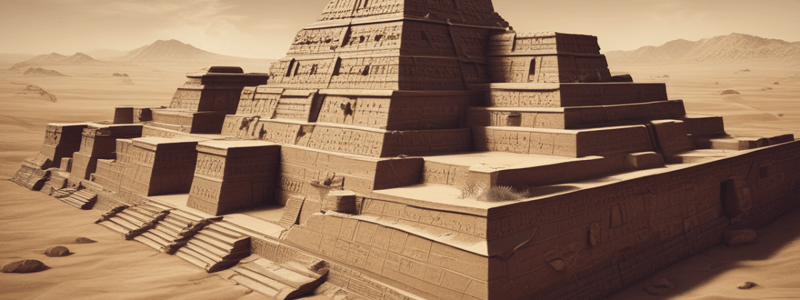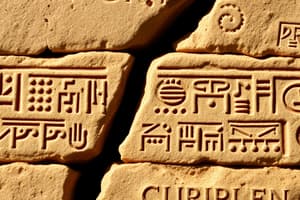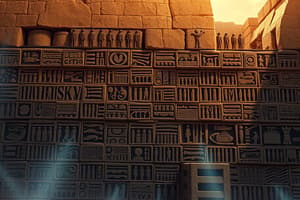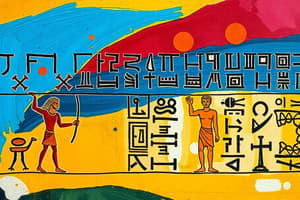Podcast
Questions and Answers
Which civilization is recognized as the world's earliest known civilization?
Which civilization is recognized as the world's earliest known civilization?
- Babylonian civilization
- Indus Valley civilization
- Egyptian civilization
- Sumerian civilization (correct)
What was the primary purpose of the Sumerian clay tablet when it was first created?
What was the primary purpose of the Sumerian clay tablet when it was first created?
- To store laws and regulations
- For trade record keeping (correct)
- To depict artistic expressions
- To record historical events
What significant invention did the Sumerians create around 3500 BC?
What significant invention did the Sumerians create around 3500 BC?
- The potter's wheel (correct)
- The compass
- The sailboat
- The water clock
What mathematical system did the Sumerians develop that influenced timekeeping and navigation?
What mathematical system did the Sumerians develop that influenced timekeeping and navigation?
Which ancient leader is known for the promulgation of the famous law code during the Old Babylonian empire?
Which ancient leader is known for the promulgation of the famous law code during the Old Babylonian empire?
What was the significance of the Sumerians in astronomy?
What was the significance of the Sumerians in astronomy?
What type of transportation vessel was invented by the Sumerians to navigate the waters between the Euphrates and Tigris rivers?
What type of transportation vessel was invented by the Sumerians to navigate the waters between the Euphrates and Tigris rivers?
Which agricultural techniques did the Sumerians develop to improve farming?
Which agricultural techniques did the Sumerians develop to improve farming?
What material did the Sumerians use for making textiles?
What material did the Sumerians use for making textiles?
Which important mathematical concept did the sexagesimal system contribute to?
Which important mathematical concept did the sexagesimal system contribute to?
Flashcards are hidden until you start studying
Study Notes
Ancient Mesopotamia and Sumer
- Ancient Mesopotamia, located in modern-day Iraq and Kuwait, is recognized as the world’s earliest known civilization.
- Civilization established around 3600 BC in the southernmost region of Mesopotamia.
Sumerian Innovations
- Sumerian clay tablets document historical information and cultural practices, initially serving as record-keeping tools for trade.
- Evolved into the use of symbols for writing laws and narratives.
Cuneiform Writing System
- The first writing system, known as Cuneiform, emerged around 3100 BC with a set of word pictures depicted in symbols.
Technological Advances
- The concept of the wheel was introduced shortly after 3500 BC, initially seen in the potter’s wheel before being adapted for wagons to transport heavy objects.
- The sailboat was developed to facilitate water transportation on the Euphrates and Tigris rivers.
Astronomy and Mathematics
- Sumerians are credited as the first astronomers, mapping celestial movements into constellations recognized by ancient Greeks.
- Developed the sexagesimal system, a counting method based on units of 60, which formed the basis of the 360-degree circle and the 60-minute hour.
Agricultural Techniques
- Systematic farming techniques included the use of seed plows and irrigation systems.
- Mastery of wool production from sheep led to advancements in textiles, including bleaching and dyeing.
Babylon and Hammurabi
- Babylon was a pivotal ancient region, functioning as a commercial and religious hub with Hammurabi as its prominent ruler (1792-1750 BC).
- Hammurabi is known for promoting the famous law code, establishing rules and standards for society.
Ancient Egyptian Achievements
- Ancient Egyptians developed techniques for metalworking to create weapons and utensils.
- Innovations included the first known glass-making, and the creation of jars and beads.
- Egyptian writing utilized ink and brushes made from papyrus reeds, while they made significant strides in anatomy and medicinal ingredient knowledge.
- A 365-day calendar was created based on astronomy, with initial measurements of 29 and a half days, later refined. Cooking and housing skills were also integral to their society.
Studying That Suits You
Use AI to generate personalized quizzes and flashcards to suit your learning preferences.




